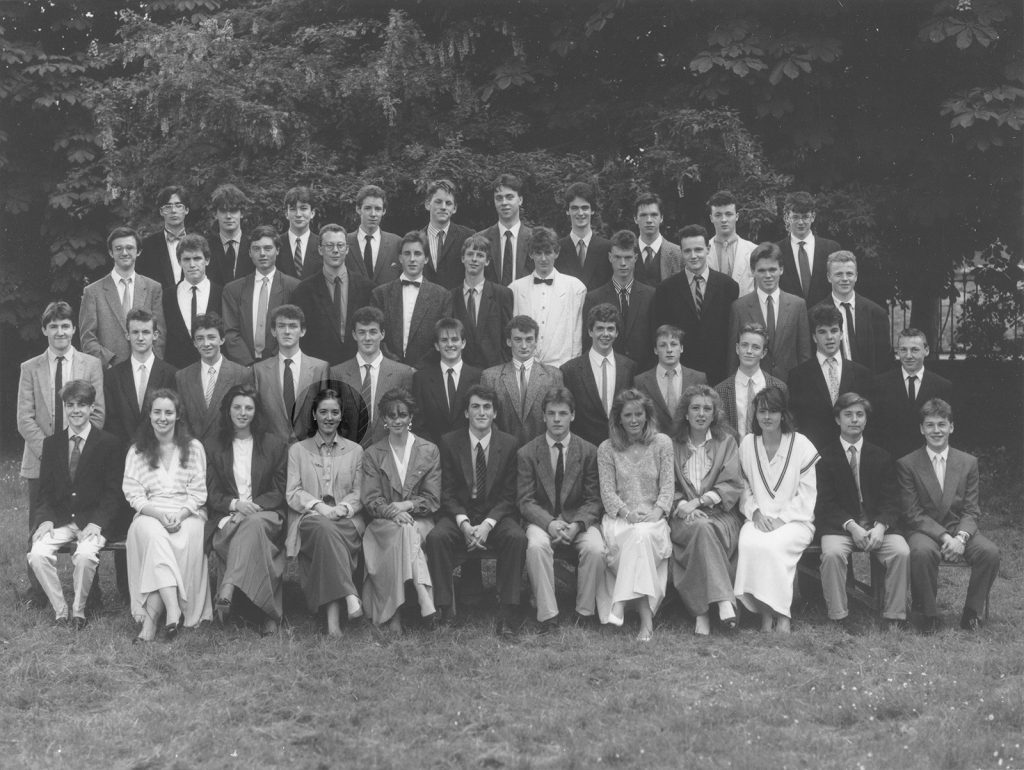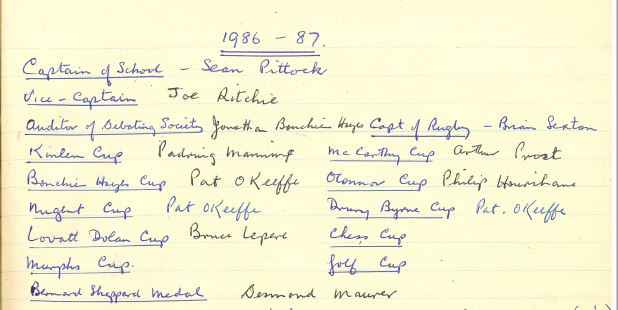Diana Spencer
22 April 2022Where you grew up…
Baggotonia, as the area was known in the 50s, was still a state of mind in the 70s. I grew up on Raglan Lane, back when it was a very different and much livelier place. We had lots of small industry (and a fair few derelict sites) around us: the Free Brothers’ carpet warehouse was thriving a few doors down, the garage at the end of the lane helped jump start our dodgy car on winter mornings, and further along on Pembroke Lane the Pasteur Dairy allowed one to sneak in and sip cream (while the Wee Stores had great deals on penny sweets…). Not to mention the pigs kept on Heytesbury Lane. Parsons Bookshop was a bit of a haven, though I could rarely afford to buy a book new – instead the Pembroke Library down by the Dodder was the place for weekly reading pilgrimages.
How you came to be at St. Conleth’s…
I had been at the Teresian School before coming to St. Conleth’s. My parents liked the idea of co-education, and that I could walk to school. So when St. Conleth’s accepted girls into Fifth Year and I got towards that point…
Favourite and/or least favourite subject in school…
I loved English and History for the first time in my schooldays, at St Conleth’s, and this was very much a result of the teachers I was lucky to have. I was very bad at following the official ‘line’ on Leaving Cert English. I never caught onto what exactly it was that the examiners wanted but I adored Mr McGloin’s quirky approach and great empathy for my eccentric rhyming attempts (‘very Irish’ I remember him telling me about one poetic composition). That our English classes were wholly successful in terms of inspiration and creativity, just not (for me) in the way that would bring me success in the Leaving, is clear from the top mark I got in the UCD Matric English paper – and my determination to study English at college. History I adored, and mostly through Mr Gallagher’s stratagems and encouragement, |I was also successful at it. Though I remember the terrible day in the mock leaving when I mistook my ‘Henris’, wrote an answer about the wrong one, and was rightly berated. History and in particular the ‘mediaeval and renaissance’ paper that we did, fascinated me. I loved the sense of exploring worlds as at once alien and familiar. Mr Gallagher’s storytelling of the past, through which acerbic filter everything was there to be eyed askance, has stayed with me to the present. As an historian and a literary scholar these two subjects at St. Conleth’s were transformative.
Fondest memory of St. Conleth’s…
The school buildings themselves were characters in the mix. They were an interesting agglomeration of old and new, with quirky corridors and twists and turns that brought one blinking into light or darkness depending on the corners turned. There was a faintly mysterious labyrinthine quality about any journey undertaken…
I don’t think I have any stand out moments. I remember the opera trip to the Gaiety with great delight: the first time I had ever seen Turandot staged. I loved the way we could mooch out to Herbert Park at lunchtime, just get out of the school confines for a little while. Art classes on Saturday mornings were very happy – there was a totally different vibe when in the school out-of-hours, surrounded by paints, scissors, mess…
Perhaps the defining feature from those mornings when I was running, panting late (as I was for the French Leaving Cert Aural exam) was Mr Kelleher emerging miraculously in front of me tapping his watch and saying ‘Miss Spencer: the nearest to the Church …’ (never needing to fill in the blank: but the furthest from God).

Who/what influenced you to pursue your chosen field…
I think I fell into it. I had always been curious about different mythologies and religions, and loved languages, and stories of strangers and other worlds, but the Teresian School stopped teaching Latin a year or two before I could have started it, so it was impossible at St. Conleth’s. This helped impel me into Beginners Latin as a Trinity undergraduate (9am every morning, not a joyful thing at any age), which entranced me. I was always curious, and wanted to know ‘why’ and ‘more’, and the model of scholarship that emerged from Mr Gallagher’s classes continued to prick me into further enquiry. It still does.
At what age did you know you wanted to work in your chosen field?
As a child I was certain I was going to be a vet or a groom. Next, I thought maybe a journalist, an architect, or a theatre director. At college, a careers advisor suggested ‘detective’. It probably wasn’t until I was in my mid 20s that I began to take an academic career seriously as an option.
Tell us about your education/ career path…
When I was near the end of my degree at Trinity (Modern English and Classical Civilization) I felt I still hadn’t found out enough about what happened next to Rome (after the 3rd century CE, where our studies stopped), and since Classics was the subject I had eventually focused on, I went to do an MA in London. Wanting to know more about the oddities of how we come to understand the past took me to a PhD at Cambridge (examining the way Alexander the Great was a cultural icon in ancient Rome). And then the track towards academia became the obvious way to proceed. After a few years in temporary and part-time posts I was fortunate to get a permanent job as a Lecturer in Classics at the University of Birmingham, and have progressed my career there ever since. These days my role is primarily in university leadership: after a stint as the Director of the College Graduate School in Arts and Law I took on the development and operation of our interdisciplinary Liberal Arts and Natural Sciences unit, and have been Dean for some years now. It’s never dull, I still work with students but I also get to talk on a daily basis to some of the world’s most brilliant scientists, scholars of politics and culture, and literature. And I can dabble a bit in University and sector politics. What could be better?
Proudest achievement to date…
The pinnacle of any academic career is being appointed Professor, and that has definitely been my proudest moment in academia. It signifies that one’s peers believe that one’s ideas and publications make a difference to the subject at the highest level, and that one is perceived to be a colleague who supports the work and development of others to make the field stronger. That’s a huge accolade.
Aspirations for the future…
My husband and I are now back more in Dublin, still in Raglan Lane, helping my mum. We hope to be able to give back more to the community in Dublin, to make a difference to the fabric of life in whatever positive way we can, and to enjoy our time ‘back home’. I am also very keen to continue to research and explore new approaches to how the past speaks to, but is also a construct of, the present. I’ve a particular interest in ‘sense of place’ and the material experience of nature in antiquity. Dublin is fortunate in having many excellent libraries and I’m hoping to continue to haunt them for research and pleasure.
Advice for people wanting to work in your sector/ general advice…

Academia is very much under threat from funding squeezes and a real-terms diminution in the amount of money received per student. Universities are being asked to do more with less, as the saying goes. For an academic career, a PhD in the relevant subject remains the foundation but increasingly postdoctoral study (for instance a fellowship) is becoming the way talented researchers have the time to publish work that will make them attractive hires in a job market with much casualisation and precarity. If this sounds bleak, I always say to aspiring PhD students ‘do it because you love it’ then think about what the doctorate qualifies you to do. In many cases excellent students with PhDs are now looking at careers in R&D in global corporations, but also at careers in academic leadership and administration as universities themselves become more corporate. A PhD doesn’t exactly qualify you for anything but opens many doors if you’ve a creative approach to what kinds of skills you’d like to develop and use in a career.